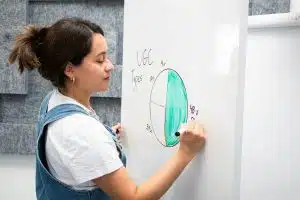Preparing for an interview can be nerve-wracking, especially if it’s your first time. In fact, a study by the Yale Center for Emotional Intelligence found that high school students reported feeling nervous 59.5% of the time while at school.
Whether you’re applying for a scholarship, a part-time job, or a leadership position, knowing what to expect can make all the difference. In this guide, we’ll go over common interview questions for high school students, provide sample answers, and share expert tips to help you feel confident and ready.
- Common Interview Questions for High School Students
- What Are Interviews for High School Students Like?
- Tips for Preparing for Your Interview
- Frequently Asked Questions
- Takeaways
Common Interview Questions for High School Students
Interviews can be a crucial part of securing scholarships, jobs, or leadership roles. Being prepared with strong, well-thought-out responses can help you stand out from other candidates. Below are some of the most commonly asked interview questions and strategies to answer them effectively.
1. Tell me about yourself.
This is probably the most common interview question and sets the stage for the rest of the conversation. It may seem simple, but it can be tricky if you’re not prepared. The goal is to provide a brief yet meaningful overview of who you are.
How to answer:
Keep your response clear and concise while offering a snapshot of who you are.
Start with your academic background. Mention your current level of education, major or field of study, and any achievements if relevant. Then, highlight a few extracurricular activities or experiences that reflect your skills, leadership, or passions.
You can also include any personal interests or goals that connect to the opportunity you’re applying for. The key is to present a brief, well-rounded picture of yourself that sets a positive tone and shows how your background aligns with the position or program.
Example answer:
“I’m a junior at Maple High School and an active member of the debate team and student government. I enjoy problem-solving and teamwork, which is why I participate in Model UN. Outside of school, I volunteer at my local library, where I help organize literacy programs for younger students.”
2. Why are you interested in this opportunity?
Interviewers ask this question to assess your level of enthusiasm and motivation. They want to understand what draws you to the role, scholarship, or position and whether your goals align with what they offer.
How to answer:
Tailor your response by connecting your personal goals, interests, and values to what the opportunity offers.
Start by researching the role, organization, or program to understand its mission, culture, and unique aspects. Then, clearly explain how these align with your aspirations—whether it’s gaining specific experience, developing certain skills, or contributing to a cause you’re passionate about.
Highlight what excites you most and briefly mention how your background or strengths make you a good fit. Most importantly, speak with genuine enthusiasm to show that you’re truly motivated and eager to be part of the opportunity.
Example answer:
“I’m interested in this scholarship because it would allow me to pursue my passion for environmental science without financial barriers. I’ve been involved in my school’s sustainability club and even organized a local tree-planting event. This opportunity would help me further my studies and make a greater impact.”
3. What are your strengths and weaknesses?
This question is designed to gauge your self-awareness. The interviewer wants to know what you excel at and whether you recognize areas where you can improve. How you discuss weaknesses also shows your willingness to grow.
How to answer:
Be honest while keeping your response thoughtful and balanced. Choose strengths that are genuinely yours and directly relevant to the opportunity. Focus on qualities like teamwork, problem-solving, or adaptability, and support them with brief examples.
When discussing a weakness, avoid something that would seriously hinder your performance; instead, mention an area where you’ve struggled but are making efforts to improve, such as time management or public speaking. This shows maturity, self-awareness, and a growth mindset—all qualities that interviewers value.
Example answer:
“One of my strengths is my ability to stay organized, which helps me balance my academic workload with extracurricular activities. A weakness I’m working on is public speaking. While I enjoy sharing my ideas, I sometimes get nervous. To improve, I’ve been practicing by joining my school’s speech club. It’s my goal to join the National Speech and Debate Tournament.”
4. Describe a time you faced a challenge and how you handled it.
Interviewers ask this question to evaluate your problem-solving skills, resilience, and ability to handle difficult situations. They are looking for specific examples that demonstrate your ability to overcome obstacles.
How to answer:
Choose a specific situation where you encountered a meaningful challenge, whether in school, an extracurricular activity, or a personal project. Briefly explain the context, what made it challenging, and most importantly, the steps you took to address it—highlighting qualities like initiative, perseverance, or creativity.
Focus on what you learned from the experience and how it helped you grow or improve. This shows not only your problem-solving skills but also your ability to reflect and turn challenges into learning opportunities.
Example answer:
“In my sophomore year, I struggled with AP Chemistry. Instead of giving up, I formed a study group and met with my teacher for extra help. Over time, my grades improved, and I even helped my peers understand difficult concepts. This experience taught me the value of persistence and teamwork.”
5. Where do you see yourself in five years?
This question helps interviewers understand your ambitions and whether you have a clear vision for your future. They want to see if your long-term goals align with the opportunity at hand.
How to answer:
Share a clear but flexible vision of your future that reflects your ambition and motivation. Talk about the direction you hope to take. Is it advancing in your field? Continuing your education? Gaining leadership experience?
Make sure your goals align with the opportunity you’re applying for, showing that this role or program is a meaningful step toward where you want to be. This demonstrates that you’re forward-thinking and intentional about your growth, while also open to learning and adapting along the way.
Example answer:
“In five years, I hope to be in college studying biomedical engineering at Duke. I’m passionate about using technology to improve healthcare, and I’d love to work on research projects that develop new medical devices. I also hope to continue volunteering in community outreach programs.”
What Are Interviews for High School Students Like?
Interviews for high schoolers are becoming increasingly common, especially for students applying to competitive private schools, selective summer programs, internships, and scholarship opportunities.
The format can vary. Some interviews feel conversational, with questions about your favorite subjects, hobbies, and future plans. Others are more structured and formal, with multiple interviewers asking deeper questions about leadership, resilience, and how you solve problems.
What’s new in high school interviews
One growing trend is the use of virtual interviews. Since 2020, more schools and scholarship committees have continued using video platforms to conduct interviews. This change allows organizations to reach more applicants but also requires students to feel comfortable communicating confidently through a screen. Many programs now assess not just academic performance but also communication skills and adaptability in digital settings.
Additionally, interviews are increasingly used to gauge qualities that are hard to capture in an application, such as curiosity, initiative, and personal growth. A recent report from the National Association for College Admission Counseling (NACAC) shows that while interviews are not always the most important factor, they do play a role in helping decision-makers differentiate between equally qualified candidates.
Tips for Preparing for Your Interview
Now that you know what high school interviews can be like, it is time to focus on how to prepare. With thoughtful interview preparation, you can walk in or log on feeling confident and ready to make a great impression.
Here are some key tips to help you get ready:
1. Practice answering common questions.
While you cannot predict every question, many interviews follow a similar structure. Expect to talk about your interests, strengths, challenges, and goals. The goal is to sound natural, not rehearsed.
How to prepare:
- Make a list of common interview questions and practice your answers out loud. Questions like “Tell me about yourself” and “Why are you interested in this opportunity?” come up often.
- Record yourself answering questions to check for clarity, pacing, and tone. Are you speaking too fast? Do you sound nervous?
- Do a mock interview with a teacher, mentor, or family member to simulate the real experience. Getting used to speaking about yourself in a structured way will help ease your nerves.
2. Know your application inside and out.
Your application is the foundation of your interview. Expect interviewers to ask about your academic achievements, extracurricular activities, and personal essay. Be ready to expand on anything you have written.
How to prepare:
- Review your application materials before the interview, especially any essays or personal statements you submitted.
- Think about how to explain your experiences in a way that connects to your future goals. If you wrote about a leadership experience, be prepared to explain what you learned from it.
- Be consistent. If your answers do not align with your application, interviewers might question how genuine your responses are.
3. Dress professionally.
First impressions matter, and how you present yourself can set the tone for the entire interview. Even if your interview is virtual, your appearance reflects your level of professionalism and preparation.
How to prepare:
- If the interview is in person, wear business casual attire, such as a button-down shirt, blouse, dress pants, or a skirt.
- For virtual interviews, dress professionally from the waist up and make sure your background is clean and distraction-free.
- Try on your outfit in advance and sit comfortably in it to ensure you feel confident and at ease.
4. Research the program or school.
Showing that you have done your homework demonstrates genuine interest. Interviewers appreciate when students come prepared with specific knowledge about the school, program, or organization.
How to prepare:
- Read about the school, program, or scholarship before your interview. Look at their mission statement, recent news, or notable alumni.
- Be ready to answer questions like “Why do you want to attend this school?” or “What interests you about this program?” with specific examples.
- If applicable, research any unique aspects of the program, such as leadership opportunities, specialized courses, or extracurricular activities that align with your interests.
5. Ask thoughtful questions.
Most interviews end with the interviewer asking, “Do you have any questions for me?” This is your chance to show curiosity and engagement.
How to prepare:
- Avoid generic questions. Instead of asking, “What opportunities are available?” try, “I’m interested in STEM research. Can you tell me about any student-led research opportunities?”
- If the interview is for a school, ask about the student experience, specific classes, or extracurricular programs like the robotics team, debate club, or community service initiatives. You could ask, “Can you tell me more about student involvement in the robotics competitions?” or “What leadership opportunities are available through student government?”
- If the interview is for a scholarship, ask about the impact of the program or the qualities they look for in recipients. For example, if applying for the Black Women in STEM Scholarship, you might ask, “How does this scholarship support recipients beyond financial aid, such as networking or mentorship opportunities?” For the National Society of High School Scholars (NSHSS) Scholarship, you could ask, “What kinds of leadership or academic achievements do you most commonly see in recipients, and how does NSHSS help them grow?”
6. Stay calm and confident.
Nerves are natural, but confidence comes with preparation. Remind yourself that the interview is not just about qualifications. It is also about personality, enthusiasm, and fit.
How to prepare:
- Take deep breaths before the interview to stay relaxed. Positive self-talk, like “I am prepared” or “I am excited to share my story,” can help.
- Focus on having a conversation rather than giving perfect answers. Interviewers are not looking for scripted responses but genuine and thoughtful ones.
- Trust yourself. You have already made it this far, and the interview is just another step in showcasing who you are.
By preparing in advance, staying confident, and being yourself, you will leave a lasting impression on your interviewer. Good luck!
Frequently Asked Questions
1. What should I do if I don’t know the answer to a question during the interview?
It’s okay to pause and think. You can also say, “That’s a great question—let me think about that for a moment.” If you truly don’t know, be honest, but show curiosity by saying you’d love to learn more.
2. How long do interviews for high school students typically last?
Most interviews last between 20 to 45 minutes. Some can be shorter if they’re very structured, while others might run longer if the conversation flows naturally.
3. Should I send a thank-you note after my interview?
Yes! A short thank-you email within 24 hours shows professionalism and appreciation. It also gives you one more chance to leave a positive impression.
4. Can I bring notes to the interview?
You can bring a small notebook with key points or questions, especially for virtual interviews, but avoid reading from a script. Aim for a conversational tone.
5. How can I practice if I don’t have anyone to do a mock interview with?
Record yourself answering questions on your phone or computer. Watching yourself back helps you spot nervous habits and adjust your pacing and tone.
Takeaways
- Practice answering common interview questions out loud to build confidence and avoid sounding rehearsed.
- Make sure you know your application well and can explain your experiences in a way that connects to your future goals.
- Dress professionally and be mindful of your body language, even for virtual interviews.
- Show genuine curiosity by asking thoughtful questions about the program or opportunity.
- If you want more one-on-one help preparing for high school interviews or college applications, consider seeking help from a private consultant.



































